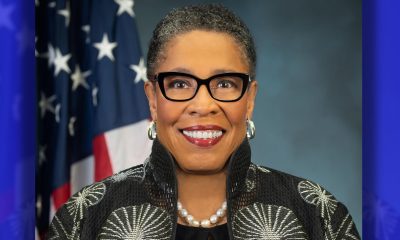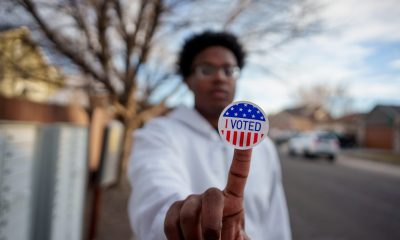Commentary
Experts: Suing the Government Not an Option to End Shutdown
NNPA NEWSWIRE — “What I fear is this administration and our Republican colleagues in the Senate have forgotten is that this is the people’s house,” said U.S. Rep. Mary Gay Scanlon (D-Pennsylvania).
By Stacy M. Brown, NNPA Newswire Correspondent
@StacyBrownMedia
As the government shutdown enters an unprecedented fifth week, some are calling for drastic measures to end the stalemate that has 800,000 government employees either working without pay or altogether furloughed and unable to put food on the table.
In a recent column, Charles Ellison, a political strategist and host of the radio program, “Reality Check” on WURD Radio, said Congressional Republicans could help re-open the government by simply corralling enough votes in both the House and Senate to arrive at the two-thirds majority needed to override any Presidential veto of the federal budget.
But Congressional Republicans – led by Senate Majority Leader Mitch McConnell (R-KY) — refuse to do that. McConnel claims that not only is he awaiting a deal between Congressional Democrats and the White House, but he also needs approval from the president before taking action.
“Which brings to mind three questions:
- Why haven’t Congressional Democrats sued Congressional Republicans?
- Could states do that instead?
- Why are Members of Congress still getting paid?”
“I don’t know if suing will get us anywhere in any type of manner,” said Delaware County, Pennsylvania Democratic Chair Colleen Guiney.
“I’m not sure if it’s an option but Democrats in Congress have seven bills to reopen the government, but McConnell is refusing to consider any of the bills. The Senate should respect the will of the people,” Guiney said.
U.S. Rep. Mary Gay Scanlon (D-Pennsylvania) said she and other Democrats have worked tirelessly to find and offer solutions to reopen the government as thousands of federal employees have gone without pay and are struggling to pay their bills and feed their families.
“What I fear is this administration and our Republican colleagues in the Senate have forgotten is that this is the people’s house,” Scanlon said. “We have an obligation to work for them. Refusing to uphold that commitment, that promise, is a slap in the face to the American people,” she said.
Former Pennsylvania Republican Rep. Alex Charlton said his guess is that if Congressional Democrats did sue Congressional Republicans it would be the “nuclear option.”
“It would significantly delay any progress towards an actual resolution,” he said.
Unlike the federal government, a state-level government shutdown in Pennsylvania is unlikely because a court decision mandates that state employees must be paid as long as the state is still collecting tax revenue, Charlton added.
“The Republican legislature has been diligent in ensuring that the state’s expenses do not outpace its revenue. Any increase beyond that would require tax increases, which the citizens of Pennsylvania do not want,” he said.
As to why federal lawmakers continue to draw a paycheck despite the shutdown, Charlton said the salaries of U.S. senators and representatives are paid by the treasury and are set by Congress itself.
“Members of Congress are paid under legislation that is separate from the appropriations bill that funds most of the government. The tax dollars that members of Congress are paid with do not come from the same budget used to pay other federal employees,” Charlton said.
Terry Madonna, a professor of Public Affairs and Director of the Center for Politics and Public Affairs at Franklin and Marshall College, said there’s no basis for a lawsuit.
“It’s a legislative function not a judiciary one,” Madonna said.
“Folks injured by the shutdown might sue but the courts would get involved in the separation of powers doctrine. That’s been in the courts now, but a federal judge refused to rule on the charge,” he said.
More pointedly, Professor Garrett Epps who’s a professor of law at the University of Baltimore, said the Constitution would not allow members of Congress to be sued for any vote or failure to vote in Congress because the Speech or Debate Clause would cover that.
“I also know that this shutdown only affects one-quarter of the federal budget so quite a few employees are still being paid like members of Congress,” Epps said.
Further, it’s Congress’ job and they make the rules so there’s no legal penalty if they don’t reopen the government, said Justin Levitt, a Constitutional law scholar and professor at Loyola Law School.
“The Constitution allows Congress to fund government, and everybody assumes that federal officials would want federal activity. But it doesn’t require Congress to fund the government,” Levitt said.
“So there’s nothing to be gained by a lawsuit. It would fail,” he said, noting that there’s currently a federal lawsuit by federal officials who aren’t getting paid, saying that it violates the 13th Amendment to force them to come to work unpaid.
However, “the courts so far have said that because those officials could quit and get another job, they don’t win either. At least so far,” Levitt said.
Also, another reason members of Congress continue to receive their pay despite the shutdown is that 75 percent of the government had already been funded prior to the shutdown, Levitt said.
“Some members have refused their salary or donated their salary, but not everybody. Ultimately, the pressure here is going to be political, rather than legal. Enough people get ticked off, and then this shutdown ends,” Levitt said.
Finally, Michael J. Gerhart who’s the Samuel Ashe Distinguished Professor of Constitutional Law at the University of North Carolina School of Law in Chapel Hill, said the shutdown is all governed by politics.
“That is, McConnell remains politically accountable for his decisions, just as Trump and the Democrats are politically accountable for theirs,” Gerhart said.
“McConnell has the power under Senate rules to block votes on legislative matters he does not wish to bring to a vote, and there is no legal basis on which Democrats could challenge his decision.”
Activism
Oakland Post: Week of April 17 – 23, 2024
The printed Weekly Edition of the Oakland Post: Week of April 17 – 23, 2024

To enlarge your view of this issue, use the slider, magnifying glass icon or full page icon in the lower right corner of the browser window. ![]()
Commentary
Opinion: Surviving the Earthquake, an Eclipse and “Emil Amok.”
Last Friday, a 4.8 magnitude earthquake shook New York City, reported as the “biggest earthquake with an epicenter in the NYC area since 1884” when a 5.2 quake hit. A bit bigger. The last quake similar to Friday’s was a 4.9 in 1783.Alexander Hamilton felt it — 241 years ago. That’s why New Yorkers were freaking out on Friday. They were in the room where it happens.

By Emil Guillermo
I’m a Northern Californian in New York City for the next few weeks, doing my one-man show, “Emil Amok, Lost NPR Host, Wiley Filipino, Vegan Transdad.”
I must like performing in the wake of Mother Nature.
Last Friday, a 4.8 magnitude earthquake shook New York City, reported as the “biggest earthquake with an epicenter in the NYC area since 1884” when a 5.2 quake hit. A bit bigger. The last quake similar to Friday’s was a 4.9 in 1783.
Alexander Hamilton felt it — 241 years ago.
That’s why New Yorkers were freaking out on Friday. They were in the room where it happens.
And it just doesn’t happen that often.
Beyonce singing country music happens more frequently.
When I felt New York shake last week, it reminded me of a time in a San Francisco TV newsroom when editors fretted about a lack of news an hour before showtime.
Then the office carpeting moved for a good ten seconds, and the news gods gave us our lead story.
On Friday when it happened in NYC, I noticed the lines in the carpeting in my room wiggling. But I thought it was from a raucous hotel worker vacuuming nearby.
I didn’t even think earthquake. In New York?
I just went about my business as if nothing had happened. After living near fault lines all my life, I was taking things for granted.
Considering the age of structures in New York, I should have been even more concerned about falling objects inside (shelves, stuff on walls) and outside buildings (signs, scaffolding), fire hazards from possible gas leaks, and then I should have looked for others on my floor and in the hotel lobby to confirm or aid or tell stories.
Of course, as a Californian who has lived through and covered quakes in the 4 to 6 magnitude range, I tried to calm down any traumatized New Yorker I encountered by taking full responsibility for bringing in the quake from the Bay Area.
I reassured them things would be all right, and then let them know that 4.8s are nothing.
And then I invited them to my consoling post-Earthquake performance of “Emil Amok, Lost NPR Host…”
It was the night of the eclipse.
ECLIPSING THE ECLIPSE
In New York City, the eclipse was about 90 percent visible. Good enough for me. Though a full solar eclipse is a celestial rarity, blockages of any sort aren’t generally celebrated. My one-man play is about growing up with the eclipsed history of American Filipinos and how I struggle to unblock all that.
For example, did you know the first Filipinos actually arrived to what is now California in 1587? That’s 33 years before the Pilgrims arrived in America on the other coast, but few know the Filipino history which has been totally eclipsed.
I was in Battery Park sitting on a bench and there was a sense of community as people all came to look up. A young woman sitting next to me had a filter for a cell phone camera. We began talking and she let me use it. That filter enabled me to take a picture of the main event with my iPhone.
For helping me see, I invited her and her boyfriend to come see my show.
Coincidentally, she was from Plymouth, Massachusetts, near the rock that says the year the Pilgrims landed in 1620.
In my show she learned the truth. The Pilgrims were second.
History unblocked. But it took a solar eclipse.
Next one in 2044? We have a lot more unblocking to do.
If you’re in New York come see my show, Sat. April 13th, 5:20 pm Eastern; Fri. April 19, 8:10 pm Eastern; and Sun. April 21st 5:20 pm Eastern.
You can also livestream the show. Get tickets at www.amok.com/tickets
About the Author
Emil Guillermo is a journalist and commentator. He does a mini-talk show on YouTube.com/@emilamok1. He wishes all his readers a Happy Easter!
Commentary
Commentary: Republican Votes Are Threatening American Democracy
In many ways, it was great that the Iowa Caucuses were on the same day as Martin Luther King Jr. Day. We needed to know the blunt truth. The takeaway message after the Iowa Caucuses where Donald Trump finished more than 30 points in front of Florida Gov. De Santis and former South Carolina Governor Nikki Haley boils down to this: Our democracy is threatened, for real.

By Emil Guillermo
In many ways, it was great that the Iowa Caucuses were on the same day as Martin Luther King Jr. Day.
We needed to know the blunt truth.
The takeaway message after the Iowa Caucuses where Donald Trump finished more than 30 points in front of Florida Gov. De Santis and former South Carolina Governor Nikki Haley boils down to this: Our democracy is threatened, for real.
And to save it will require all hands on deck.
It was strange for Iowans to caucus on MLK day. It had a self-cancelling effect. The day that honored America’s civil rights and anti-discrimination hero was negated by evening.
That’s when one of the least diverse states in the nation let the world know that white Americans absolutely love Donald Trump. No ifs, ands or buts.
No man is above the law? To the majority of his supporters, it seems Trump is.
It’s an anti-democracy loyalty that has spread like a political virus.
No matter what he does, Trump’s their guy. Trump received 51% of caucus-goers votes to beat Florida Gov. Ron DeSantis, who garnered 21.2%, and former South Carolina Gov. Nikki Haley, who got 19.1%.
The Asian flash in the pan Vivek Ramaswamy finished way behind and dropped out. Perhaps to get in the VP line. Don’t count on it.
According to CNN’s entrance polls, when caucus-goers were asked if they were a part of the “MAGA movement,” nearly half — 46% — said yes. More revealing: “Do you think Biden legitimately won in 2020?”
Only 29% said “yes.”
That means an overwhelming 66% said “no,” thus showing the deep roots in Iowa of the “Big Lie,” the belief in a falsehood that Trump was a victim of election theft.
Even more revealing and posing a direct threat to our democracy was the question of whether Trump was fit for the presidency, even if convicted of a crime.
Sixty-five percent said “yes.”
Who says that about anyone of color indicted on 91 criminal felony counts?
Would a BIPOC executive found liable for business fraud in civil court be given a pass?
How about a BIPOC person found liable for sexual assault?
Iowans have debased the phrase, “no man is above the law.” It’s a mindset that would vote in an American dictatorship.
Compare Iowa with voters in Asia last weekend. Taiwan rejected threats from authoritarian Beijing and elected pro-democracy Taiwanese vice president Lai Ching-te as its new president.
Meanwhile, in our country, which supposedly knows a thing or two about democracy, the Iowa caucuses show how Americans feel about authoritarianism.
Some Americans actually like it even more than the Constitution allows.
About the Author
Emil Guillermo is a journalist and commentator. He does a mini-talk show on YouTube.com/@emilamok1.
-

 Activism4 weeks ago
Activism4 weeks agoOakland Post: Week of March 27 – April 2, 2024
-

 #NNPA BlackPress4 weeks ago
#NNPA BlackPress4 weeks agoCOMMENTARY: D.C. Crime Bill Fails to Address Root Causes of Violence and Incarceration
-

 #NNPA BlackPress4 weeks ago
#NNPA BlackPress4 weeks agoMayor, City Council President React to May 31 Closing of Birmingham-Southern College
-

 #NNPA BlackPress4 weeks ago
#NNPA BlackPress4 weeks agoBeloved Actor and Activist Louis Cameron Gossett Jr. Dies at 87
-

 Community1 week ago
Community1 week agoFinancial Assistance Bill for Descendants of Enslaved Persons to Help Them Purchase, Own, or Maintain a Home
-

 Activism3 weeks ago
Activism3 weeks agoOakland Post: Week of April 3 – 6, 2024
-

 Business1 week ago
Business1 week agoV.P. Kamala Harris: Americans With Criminal Records Will Soon Be Eligible for SBA Loans
-

 Activism2 weeks ago
Activism2 weeks agoOakland Post: Week of April 10 – 16, 2024
























































2 Comments